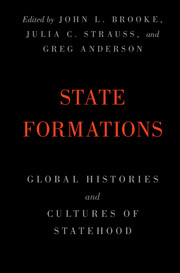Book contents
- State Formations
- State Formations
- Copyright page
- Dedication
- Contents
- Figures and Maps
- Tables
- Contributors
- Preface
- Acknowledgments
- Introduction
- Part I Definitions
- Part II Foundings
- Part III Agendas
- 10 Empire as State
- 11 Weights and Measures and State Formation
- 12 Mapping Power
- 13 To Bee or Not to Bee
- 14 Taxes and the Two Faces of the State since the Eighteenth Century
- 15 Regimes and Repertoires of State Building
- Part IV Memberships
- Conclusion
- Index
13 - To Bee or Not to Bee
The Coproduction of Modern Science and the Modern State
from Part III - Agendas
Published online by Cambridge University Press: 23 March 2018
- State Formations
- State Formations
- Copyright page
- Dedication
- Contents
- Figures and Maps
- Tables
- Contributors
- Preface
- Acknowledgments
- Introduction
- Part I Definitions
- Part II Foundings
- Part III Agendas
- 10 Empire as State
- 11 Weights and Measures and State Formation
- 12 Mapping Power
- 13 To Bee or Not to Bee
- 14 Taxes and the Two Faces of the State since the Eighteenth Century
- 15 Regimes and Repertoires of State Building
- Part IV Memberships
- Conclusion
- Index
Summary
- Type
- Chapter
- Information
- State FormationsGlobal Histories and Cultures of Statehood, pp. 215 - 228Publisher: Cambridge University PressPrint publication year: 2018
- 1
- Cited by



